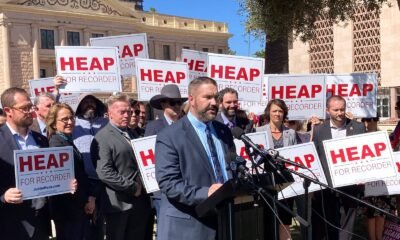acc
The Arizona Corporation Commission Uncovered: The Surprising Impact of Your Vote

Voters in Arizona will face significant choices in the upcoming ballot, particularly regarding the Arizona Corporation Commission (ACC). This November, three out of five commission seats will be contested, and the implications of these elections stretch far beyond politics. The ACC plays a critical role in regulating utility rates for essential services like water, gas, and electricity across the state.
The commission’s decisions directly affect residents who rely on Arizona Public Service (APS), Tucson Electric Power (TEP), and other utility providers. For those using natural gas from Southwest Gas or receiving water from companies like Global Water or EPCOR, the ACC’s influence is undeniable. Furthermore, individuals interested in solar energy or energy-efficient practices must pay attention, as the commission shapes the state’s energy policy and infrastructure.
Recent actions by the ACC have raised concerns. They’ve made crucial decisions affecting rates for major utilities, hindered the growth of community solar projects, and increased costs for solar customers. Additionally, they have rolled back energy efficiency programs and eliminated renewable energy standards, which are vital for reducing both utility costs and environmental impact.
ACC candidates are running statewide, meaning every voter across Arizona has the same options. With a simple majority needed to make decisions affecting utilities, it’s crucial that voters understand the significance of their choices. Historically, the margin of victory was just 57,000 votes in the last election, highlighting that every vote truly matters.
Six candidates are competing for the open commission seats: Ylenia Aguilar (D), Jonathon Hill (D), Lea Marquez Peterson (R), Joshua Polacheck (D), Rene Lopez (R), and Rachel Walden (R). Notably, only Marquez Peterson is an incumbent. Candidates have made their platforms accessible through various channels, encouraging voters to research each of them before casting their ballots.
Election logistics are quickly approaching. Mail-in ballots will be sent to voters starting October 9th, with requests for these ballots due by October 25th. Completed ballots must be returned by October 29th, and early in-person voting ends on November 1st. Election Day falls on November 5th, with polls operating from 6 AM to 7 PM. Voters are urged to prepare thoroughly, as this year’s lengthy ballot includes crucial races beyond the ACC.
As residents navigate their voting decisions, understanding the role and impact of the Arizona Corporation Commission is essential. With significant implications for utility costs and environmental strategies, the ACC races warrant careful consideration.
Autumn Johnson, the Executive Director of the Arizona Solar Energy Industries Association, emphasizes the urgency for voters to educate themselves on these pivotal issues.


















